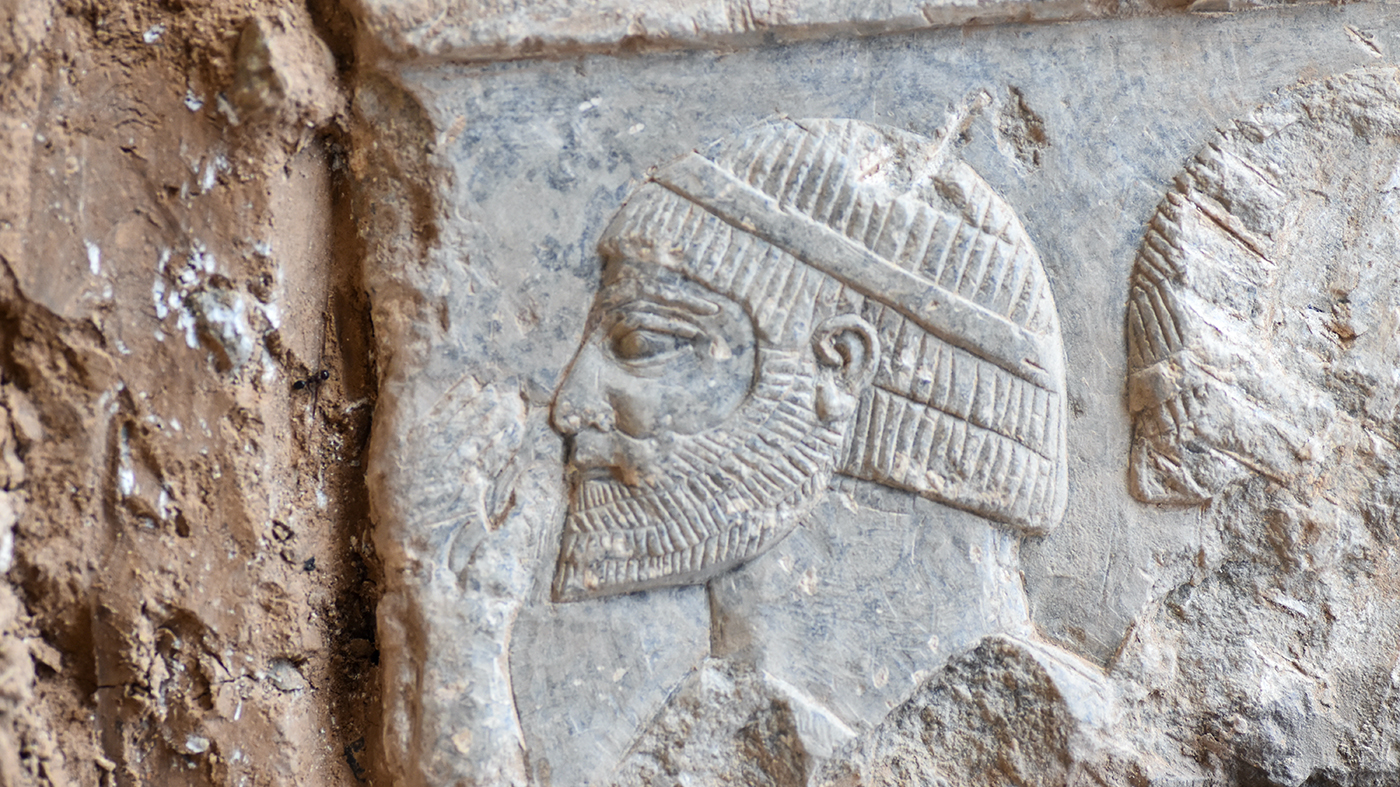Penn Museum and Iraqi Archaeologists Uncover 2,700-Year-Old Artifacts, After Destruction by ISIS

PHILADELPHIA—In partnership with an Iraqi excavation team, researchers from the University of Pennsylvania Museum of Archaeology and Anthropology have unearthed intricate rock carvings that are 2,700 years old at Nineveh, a site on the east side of the Tigris River, inside the city of Mosul in Northern Iraq. Now, with support from the ALIPH Foundation, they are working to carefully reconstruct the ancient city’s Mashki Gate—one of the many Mesopotamian monuments that were destroyed by militants from the so-called Islamic State of Iraq and Syria (ISIS).
Through a community-led excavation, conservation, and restoration project funded by the Penn Museum, an international team of archaeologists found seven marble reliefs depicting finely chiseled war scenes, mountains, grape vines, and palm trees—a monumental and meaningful find amid the area’s cultural destruction. Skillfully carved with exceptional details, these remarkable ancient panels will remain in Iraq, with plans for building a visitor center at Nineveh, advancing research and understanding of ancient Mesopotamian history for generations to come.
One of the biggest discoveries since the 19th century, these superbly preserved reliefs date back to an Assyrian king who ruled Nineveh from 705 to 681 BCE. Known for his military campaigns, including one referenced in the Bible, King Sennacherib constructed 18 similar gates surrounding the city, but the Mashki Gate, the “Gate of the Watering Places,” was important for its direct access to the Tigris.
Reconstructed in the 1970s by the Nineveh Inspectorate of Iraq’s State Board of Antiquities and Heritage, this prominent monument is located on the main north-south highway, easily visible from the west side of the Tigris. The gate symbolizes Mosul’s deep history and continues to be an important shared site for Christians, Jewish people, and Muslims. In 2016, during their occupation of Iraq, ISIS militants used a bulldozer to destroy the gate—a deliberate attempt to erase the cultural memory of Iraq’s Assyrian heritage.
Yet amid the chaos and conflict, these seven reliefs survived, buried in an area that had not yet been excavated—until now.
A team of scholars and archaeologists worked in partnership with the Iraqi excavation team to restore this piece of Iraq’s cultural heritage: Field Director Dr. Michael D. Danti, the director for Penn’s Iraq Heritage Stabilization Program; Dr. Richard L. Zettler, associate curator-in-charge of the Penn Museum’s Near East Section and associate professor in the Penn School of Arts and Sciences’ Department of Near Eastern Languages and Civilizations; Dr. Ali al-Jabbouri, the former dean of the University of Mosul’s College of Archaeology; Dr. John MacGinnis from the University of Cambridge; and Dr. Darren P. Ashby, program manager of the Iraq Heritage Stabilization Program.
“What we’re trying to do is preserve cultural diversity and protect cultural freedom of expression in a way that meets the expectations and priorities of both the local community and the Iraq State Board of Antiquities and Heritage,” says Dr. Danti, who is also a consulting scholar at the Penn Museum.
Their goal is to conserve ancient Nineveh as a massive archaeological site within a modern city, moving it towards becoming a UNESCO World Heritage site to ensure its future preservation, as well as to promote sustainability for the people of East Mosul.
“For an archaeologist, a discovery of this magnitude is an honor, a serious responsibility. In a way, Mashki Gate is a symbol of international hope and cross-cultural collaboration. Out of the ashes, a phoenix rises,” Dr. Danti adds.
“These are the first Assyrian reliefs to have come out of the ground in 75 years at least,” Dr. Zettler explains. “This discovery adds new data and ultimately advances the understanding of Neo-Assyrian history in ancient Mesopotamia.”
“We are thrilled by the ongoing conservation of this incredibly rare and historic find,” says Dr. Christopher Woods, Williams Director at the Penn Museum and the Avalon Professor of the Humanities at Penn’s School of Arts and Sciences, who specializes in ancient Mesopotamian languages and civilizations. “Encouraged by the Nineveh Inspectorate of Iraq’s State Board of Antiquities and Heritage to expand our cultural heritage work and Neo-Assyrian archaeological research in their region, the Penn Museum is excited to be collaborating in this international effort towards post-conflict reconciliation.”
In their previous cultural heritage work, Dr. Zettler and Dr. Danti have had a long history of collaborating with Iraqi officials to restore sites in various stages of disrepair, including Taq-i Kisra, a major landmark south of Baghdad. During the coming months, excavations at Mashki Gate will continue through the chambers that remain unexplored, while the team works to conserve the ancient reliefs, preparing to share them with the world.
###
About the Penn Museum
The Penn Museum’s mission is to be a center for inquiry and the ongoing exploration of humanity for our University of Pennsylvania, regional, national, and global communities, following ethical standards and practices. Through conducting research, stewarding collections, creating learning opportunities, sharing stories, and creating experiences that expand access to archaeology and anthropology, the Museum builds empathy and connections across diverse cultures.
The Penn Museum is open Tuesday-Sunday, 10:00 am-5:00 pm. It is open late the first Wednesday of each month from 5:00-8:00pm. The Café is open Tuesday-Thursday, 9:00 am-3:00 pm and Friday and Saturday, 10:00 am-3:00 pm. For information, visit www.penn.museum, call 215.898.4000, or follow @PennMuseum on social media.



